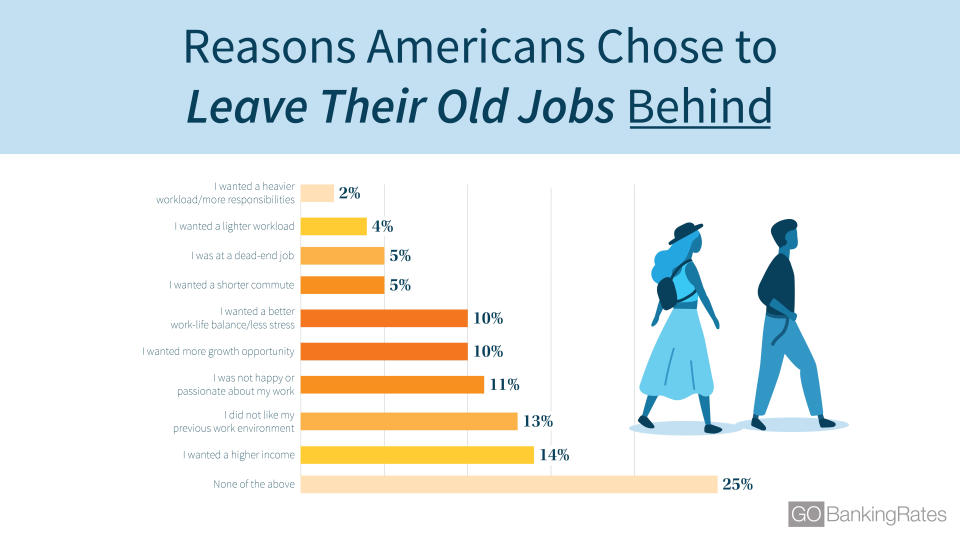23% of Americans Regret Their Job Change — Here’s Why

The norm of staying with the same company for decades before retiring with a pension has become shockingly outdated in today’s economy. According to data from the Bureau of Labor Statistics, the median tenure at a job in 2018 was just 4.2 years, with younger workers spending much less time with their current employer.
But why is that? What is driving Americans to change jobs? That question was at the heart of a survey conducted by GOBankingRates, which asked 502 Americans who have changed jobs in the last two years questions about why they left and why they might regret their choice. The survey revealed that the No. 1 reason people regret their job change is because they miss their old boss and/or co-workers. However, although this was the top answer, only a small percentage of all respondents chose this reason.
See more reasons people are leaving their jobs, how their job changes worked out, and if men and women make career moves for similar or different reasons. Americans might be changing jobs, but most still love what they do.
Who Is Changing Jobs and Why?
Forty-eight percent of poll respondents were earning under $25,000 a year at their old jobs. According to Census data, only 27.9 percent of adults with at least some reported income were in that income bracket. It’s clear that people are much more likely to be switching jobs when they’re earning less.
Find Out: These Are the Best Times to Ask for a Raise — and Get It

Despite their low wages, the people polled had a variety of reasons for changing jobs. Just 14 percent of respondents said their primary reason for switching was a higher income. This is surprisingly low, considering how many respondents reported earning less than half of the national median income.
In fact, there were four other reasons for changing jobs that more than 10 percent of respondents selected: Disliking the work environment, needing more opportunity for growth, seeking a better work-life balance and not feeling passionate about the job. All these reasons focus on quality-of-life issues, suggesting that unhappiness with a low-paying job isn’t about the pay itself.
It’s also worth noting just how diverse the responses are. With five different responses getting 10 percent or more of the votes, one in four people still answered that none of the nine potential responses described their reasons for leaving. There are clearly many different reasons people are motivated to leave a job.
Are They Happy With Their Decision?
Almost one in four respondents said they regretted their job change. Find out if you’re financially ready to quit your job. Even if you think your current job isn’t ideal, this survey shows there are real reasons to approach a decision to leave it with considerable caution. After all, almost half of these people were earning less than $25,000 a year at their old position.

People regret their job change because they miss the people they used to work with. That is what one in 10 people say is their biggest regret, beating out the eight other provided responses and giving reason to believe that a good relationship with your coworkers might be reason enough to stick with a job, even if the pay is less than desirable.
However, the responses also appear to indicate that the specifics of what motivates people to change jobs and how they ultimately feel about the decision are too diverse to capture in a survey — even one with nine possible answer choices.
Some 41 percent of respondents answered that none of the potential answers — spanning a variety of potential reasons, from benefits package size to the new position failing to meet expectations — accurately described what they regretted most. That would seem to indicate that there are a lot of personal factors playing into how people feel about their job change choices.
Learn More: 24 Tips to Change Your Career and Land Your Dream Job
Are Men More Ambitious Than Women?
Comparing responses across genders uncovers some intriguing differences in how men and women view their need to change jobs. While the responses appear to indicate that climbing the corporate ladder and earning more money is more important to men looking to go somewhere new, men also might not be finding what they are looking for at their new jobs.
When asked why they wanted to change jobs, men were 28.6 percent more likely to answer that they wanted a higher income and over 47.6 percent more likely to say that they want more growth opportunity. Women, meanwhile, were 28 percent more likely to say that they weren’t happy or passionate about their work and 24 percent more likely to say that none of the provided responses described their reasons for wanting to change.
Q: What Was the Primary Reason That Made You Decide to Change Your Job
Male Responses | Female Responses | |
I wanted a higher income | 16% | 12% |
I didn’t like my previous work environment | 13% | 14% |
I was not happy or passionate about my work | 10% | 13% |
I wanted a better work-life balance | 12% | 8% |
I wanted more growth opportunity | 13% | 8% |
I was at a dead-end job | 5% | 5% |
I wanted a better/shorter commute | 4% | 5% |
I wanted a lighter workload | 3% | 5% |
I wanted a heavier workload/more responsibilities | 2% | 2% |
None of the above | 22% | 28% |
Find Out: How I Turned My Passion Into a Full-Time Career
But after examining people’s regrets after changing jobs, it would appear that men’s motivations for leaving their old jobs weren’t necessarily producing the desired results. Men were almost 21 percent more likely to regret their change, and they were more than twice as likely to say that the reason why was a lack of growth opportunity at the new job. They were also about 46 percent more likely to say that the new role was not what they were expecting.
While it would be a mistake to make a blanket assumption that the men in this survey are more ambitious than women — after all, leaving your job because you’re not passionate about your work is a pretty clear sign of ambition — the results of the survey indicate these men are more likely to seek things like salary or title while women are focused more on finding fulfillment through work.
Regardless of how you want to define their motivations, men are more likely to discover that their new job failed to satisfy their reasons for leaving. Men left their old jobs seeking chances for advancement and then were disappointed that their new job didn’t have those opportunities.
Your Career Is About You, First and Foremost
There is one clear takeaway from this survey: Everyone has a different explanation for why they left their job. For all the conclusions you can draw from people’s answers, it’s the lack of consolidation behind any one reason that sticks out. Despite nine different answers provided for each of “what was the primary reason that made you decide to change your career/job?” and “what do you regret most about your career/job change?” the most common response was “none of the above” — by a wide margin.
That seems to indicate that successfully leaving one job for another involves looking inward more than anything else. The responses to this survey paint a picture of people who feel like the motivations one might assume are central to a job change decision — salary, benefits and potential for promotion — don’t truly encapsulate why they needed to try something different.
If you’re considering taking a different job, the best piece of advice based on the survey is to really think about your specific job situation and what a change might mean. Your happiness with your work has everything to do with you, and leaving a job for the wrong reasons can lead to some serious regrets.
Click through to learn 13 important career lessons.
More on Making Money and Jobs
We make money easy. Get weekly email updates, including expert advice to help you Live Richer™.
Methodology: GOBankingRates commissioned a survey, conducted by Survata, to explore why people change jobs. Survata interviewed 502 online respondents between Jan. 8 and Jan.9, 2019. Respondents were reached across the Survata publisher network, where they take a survey to unlock premium content, like articles and ebooks. Respondents were asked a screener question (“Have you changed jobs/careers in the past 2 years?”) and then six follow-up questions: “How much did you earn in your previous career/job?,” “How much do you earn in your new career/job?,” “What was the primary reason that made you decide to change your career/job?,” “What do you regret most about your career/job change?,” “How many months did your career/job transition take?,” and “Do you regret your most recent job or career change?”
This article originally appeared on GOBankingRates.com: 23% of Americans Regret Their Job Change — Here’s Why

